RANITIDINE - INJECTION
PHONETIC PRONUNCIATION: (ra-NI-ti-deen)
COMMON BRAND NAME(S): Zantac
GENERIC NAME(S): ranitidine HCl
Uses
USES: Ranitidine is used to treat ulcers of the stomach and intestines and prevent them from coming back after they have healed. This medication is also used to treat certain stomach and throat (esophagus) problems (such as erosive esophagitis, gastroesophageal reflux disease-GERD, Zollinger-Ellison syndrome). It works by decreasing the amount of acid your stomach makes. It relieves symptoms such as cough that doesn't go away, stomach pain, heartburn, and difficulty swallowing. Ranitidine belongs to a class of drugs known as H2 blockers. This form of ranitidine is given by injection and is used for short-term treatment of these conditions when you cannot take this medication by mouth. Your doctor should switch you to taking this medication by mouth when possible.
How to use RANITIDINE - INJECTION
HOW TO USE: Read the Patient Information Leaflet if available from your pharmacist before you start using ranitidine and each time you get a refill. If you have any questions, ask your doctor or pharmacist. This medication is given by injection into a vein or muscle as directed by your doctor. Premixed bags should only be given into a vein. The dosage and length of treatment are based on your medical condition and response to treatment. In children, the dosage may also be based on body weight. If you are using this medication at home, learn all preparation and usage instructions from your health care professional. Before using, check this product visually for particles or discoloration. If either is present, do not use the liquid. Learn how to store and discard medical supplies safely. Tell your doctor if your condition does not improve or if it worsens.
Side Effects
Precautions
Interactions
Overdose
Images
Reviews
Faq for RANITIDINE - INJECTION
Ranitidine injection is a medication used to treat and prevent ulcers in the stomach and intestines. It is also used to treat conditions where the stomach produces too much acid, such as Zollinger-Ellison syndrome.
Ranitidine is a histamine-2 blocker that works by reducing the amount of acid produced in the stomach. It does this by blocking the action of histamine, a substance that stimulates the production of acid.
Ranitidine injection is given by a healthcare professional in a hospital or clinic setting. It is either injected directly into a vein (intravenous) or injected into a muscle (intramuscular). The dosage and frequency of administration will be determined by the doctor based on individual needs.
Common side effects of ranitidine injection may include headache, dizziness, diarrhea, constipation, and stomach pain. These side effects are usually temporary and go away on their own. However, if they persist or worsen, it is important to contact a healthcare provider.
Yes, ranitidine injection can be used in children, but only under the supervision of a healthcare professional. The dosage and administration will be determined by the child's age and medical condition.
Ranitidine injection is generally considered safe to use during pregnancy. However, it is recommended to consult with a healthcare provider before using this medication.
Ranitidine injection may interact with other medications, including antacids, sucralfate, and certain antibiotics. It is important to inform the healthcare provider about all the medications being taken to prevent any potential interactions.
The onset of action of ranitidine injection varies from person to person. Generally, it starts working within a few hours. However, it may take several days to see the full benefits of the medication.
Yes, there are generic versions of ranitidine injection available. The generic name for ranitidine is "ranitidine hydrochloride."
Disclaimer
IMPORTANT: HOW TO USE THIS INFORMATION: This is a summary and does NOT have all possible information about this product. This information does not assure that this product is safe, effective, or appropriate for you. This information is not individual medical advice and does not substitute for the advice of your health care professional. Always ask your health care professional for complete information about this product and your specific health needs.
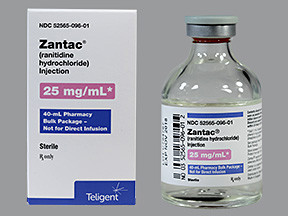
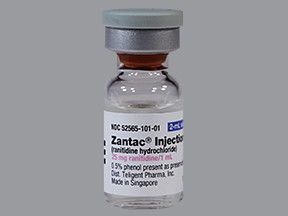
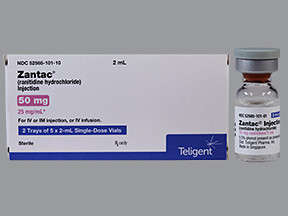

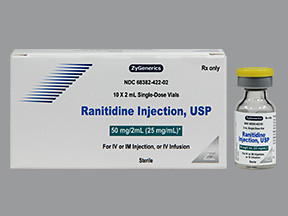
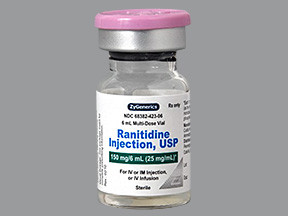
No Reviews Yet